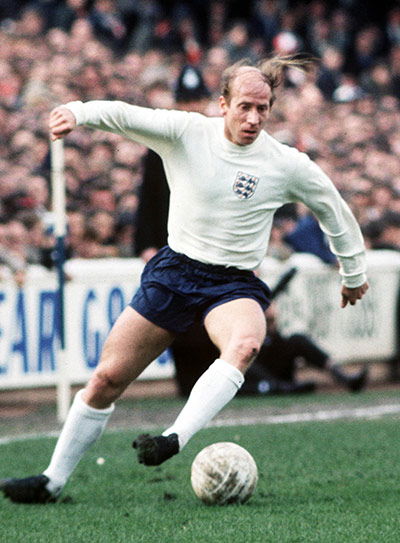

The Ballon d’Or is an award with a lot of significance to the players who win it. It means that you were the best player that year. Since its inception in 1956, some of the the names that have won it are going to be remembered as legendary ones. However, there have been both wide & narrow margins between the victor and runner-up.
Watch What’s Trending Now!
Let’s take a look at some of the smallest margins while winning the Ballon d’Or that led to some close battles between the top two players for world dominance that respective year.
11. 1965 – 8 points
ADVERTISEMENT

ADVERTISEMENT
Eusébio (67) and Giacinto Facchetti (59)
One of the finest players in Benfica and Portugal, Eusébio had been banging in goals at the rate of more than 1 goal per match over the last few seasons. It was no surprise, given that no striker at that time was as clinical. Given his rich trophy collection, it was more a matter of time when he would finally land the grandest individual award in football. He also had a trophy collection that many would envy, with a total of 29 trophies. He also led Portugal to a third-place World Cup finish in 1966.
ADVERTISEMENT
Giacinto Facchetti was a one-club man and was part of the golden generation of Inter Milan in the 1960s. He would never finish in the top 3 of the Ballon D’or again but he had international and club success and was named in the FIFA 100, along with Eusébio.
10. 1968 – 8 points
ADVERTISEMENT
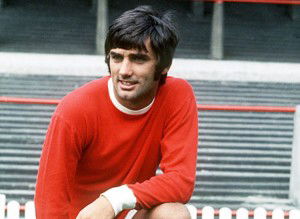
George Best (61) and Bobby Charlton (53)
ADVERTISEMENT
In what would end up as one of the finest seasons for Manchester United and for George Best, he scored 32 goals as United won their first European Championship. The Ballon d’Or was the icing on the cake as a whole list of individual accolades followed Best.
Charlton was another key member for United, who had one of his most prolific seasons with United. His consistency was shown as he had been in the Ballon d’Or top 2 since 1966.
9. 1970 – 7 points
ADVERTISEMENT
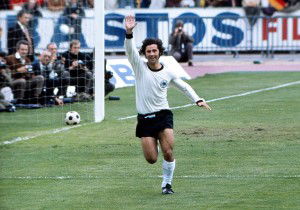
ADVERTISEMENT
Gerd Muller is one of the most lethal forwards to have ever played the game. His stats speak for themselves and so do his club accolades. What truly sealed his Ballon d’Or win this year was his performance in the 1970 World Cup, when he scored 10 goals for West Germany and also had a prolific club season.
Described by Pele as his greatest adversary, Bobby Moore is one of the greatest (if not the greatest) Englishman to play for the country, and had captained the team in the 1966 triumph. While having had a mixed year, the best highlight was his tackle on Jairzinho, in the Brazil-England match, which people have described as the perfect tackle in football.
8. 1961 – 6 points
ADVERTISEMENT
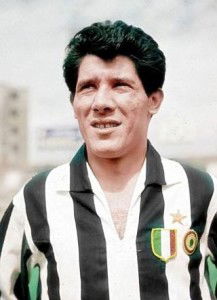
The 1961 vote featured players from two Italian teams. Omar Sivori transferred to Juventus in 1957 after immigrating from Argentina. One of the club’s most prolific strikers, he was their top scorer for the first four seasons since he joined. His 1960/61 & 1959/60 seasons were among his personal bests. He finished his Juventus career with three Serie A titles as well as two Coppa Italia cups.
Luis Suarez had already won the Ballon d’Or when he made a move from FC Barcelona to Inter Milan. One of the key midfielders in Inter, he was part of one of Inter Milan’s finest teams – winning 3 Serie A titles, 2 European Cups and 2 Intercontinental cups. It would not be the last time Suarez would finish high up in the Ballon d’Or voting but he would not win it again.
7. 1978 – 6 points
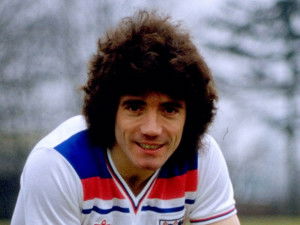
Kevin Keegan (87) and Hans Krankl (81)
As stated earlier, Kevin Keegan had catapulted himself as one of the top players in Europe with his performances with Hamburg. Keegan had the most prolific of his three years at Hamburg, and Hamburg began what would be a title winning season in 1978. The 1978 vote saw him beat Hans Krankl, who many regard as the finest Austrian footballer. He had successful stints at Barcelona and Rapid Wien, and the 1978 season saw him score a lot of goals with the Catalan outfit as well as win the Copa del Rey.
6. 1969 – 4 points
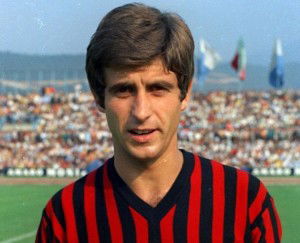
Gianni Rivera (83) and Luigi Riva (79)
Gianni Rivera was an interesting candidate to have won the Ballon d’Or. He was one of the most technically gifted offensive midfielders who had the skills, vision, grace and also an eye for goal. However, he had a poor work rate and rarely contributed to the defence. 1969 was not one of his better years but he helped Milan achieve European glory that year.
Luigi Riva was one of the finest strikers from Italy. Having shifted from a winger to a striker’s position, he was the complete package in that position. His ability to score with either foot, his dribbling, volleying & set-piece abilities made him what he was. His 35 goals in 42 games for Italy is an astonishing return. 1969 was one of his best years with Calgiri.
5. 1956 – 3 points
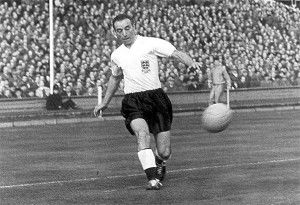
Stanley Matthews (47) and Alfredo Di Stefano (44)
The inaugural Ballon d’Or. No matter how great other players were, Sir Stanley Matthews can always have the claim of winning the first ever. Noted for his fitness, Matthews played an exceptionally long career with Stoke City and Blackpool. He just has a sole FA Cup to his name but has a legacy like no other. He is also the oldest winner of the award, having received it at the age of 41.
Di Stefano was one of the Real Madrid greats. Having been a key player in the golden generation of players, it was a shock to many for him to come second to Matthews in the voting. Stefano would go on to win the award twice as well as a whole accolade of trophies, including 5 European Championships!
4. 1977 – 3 points
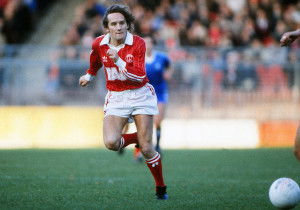
Allan Simonsen (74) and Kevin Keegan (71)
Simonsen had won the Ballon d’Or with Mönchengladbach. He was a key part of the side that won 3 Bundesliga titles and was a tough team to beat in European football at that time. He would play with FC Barcelona with limited success after his stint in Germany and he never really moved to those heights again.
Keegan had switched from a successful spell at Liverpool where he had established his name to Hamburg in Germany. From an individual view, his 3 seasons at Hamburg saw him being acclaimed as the finest player in Europe for a while. While he lost to Simonsen in the voting of 77, he would win the next 2 editions of the Ballon d’Or .
3. 1972 – 2 points
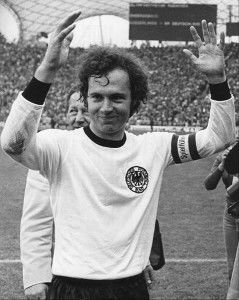
Franz Beckenbauer has been voted as one of the best defensive midfielders ever and was a key member in West Germany and Bayern Munich’s success as much as his team mate Muller. 1972 was one of his best seasons as Bayern won the Bundesliga and he won the UEFA Euro 1972.
Muller had another amazing season for club & country while Netzer was having some of his best seasons with Borussia Mönchengladbach, and was also part of the same team that would win the Euro with Muller & Beckenbauer.
2. 1966 – 1 point
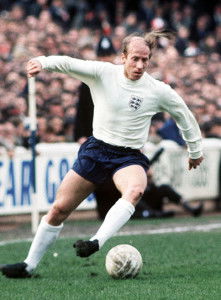
Bobby Charlton is an English and Manchester United legend. He holds numerous records for United and England and was a key member of the squad that won the first European Championship for United, even after the Munich air disaster. Re-establishing United as a force in English football, 1966 saw him play a key role in the English World Cup triumph, which might have swayed the vote in his favour for the Ballon d’Or.
Eusébio had another fine domestic season and was in the form of his life. He did not disappoint on the national stage as he dragged Portugal to a third-place finish in the World Cup, and was the top scorer with 9 goals. However, he lost by the narrowest of margins possible.
1. 1996 – 1 point
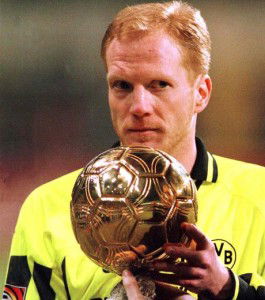
Matthias Sammer was a fine sweeper. Approaching the end of his career, he was part of a successful mid-90s Dortmund team that won two Bundesliga titles, two DFL-Supercups and a Champions League title. This was a fitting end to a career as he would retire a couple of years after winning this award.
The runner up, by just a single point, was Brazilian sensation Ronaldo. 1996 was the year he really made his mark in European club football as he had a single yet prolific season with FC Barcelona. He would go on to win it twice and finish third in the voting once.
ADVERTISEMENT
ADVERTISEMENT
ADVERTISEMENT

